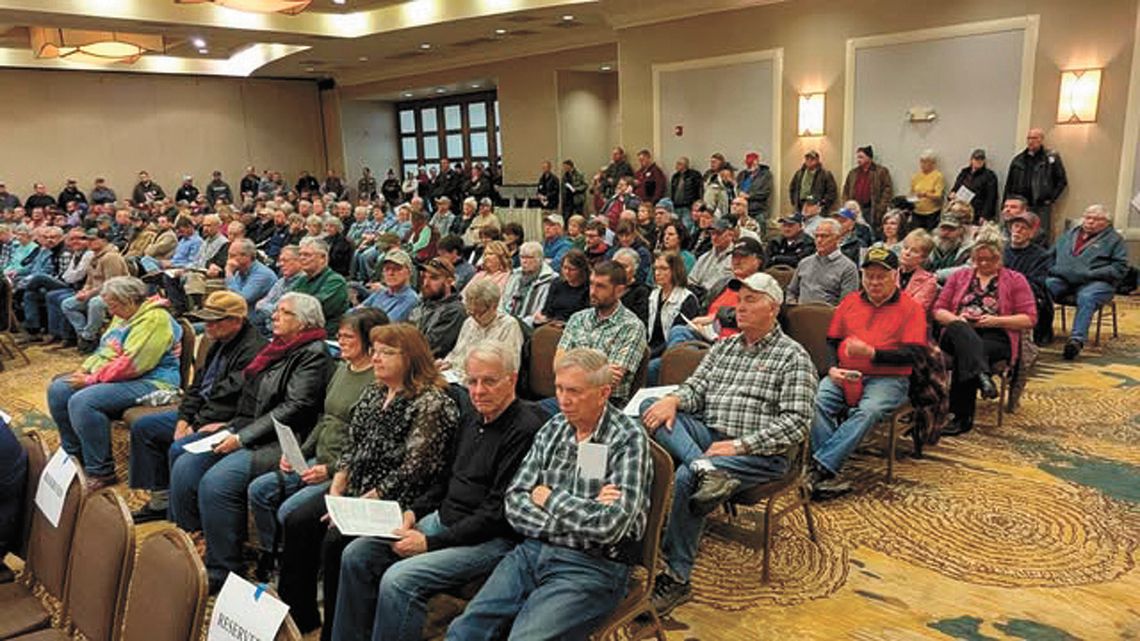No means no not only on a date, but when it comes to a proposed carbon capture pipeline planned to cross parts of eastern South Dakota.
That was the comparison Lanette Butler of McPherson County made during a state Public Utilities Commission meeting on Friday, Jan. 17 at the Dakota Event Center in Aberdeen. The session was to gather feedback about Summit Carbon Solutions’ pipeline plan.
The no-means-no-theme was a prime one during the meeting, which was attended by roughly 300 people.
Based on comments, applause and an informal survey, a strong majority were opposed to the pipeline plan. But, the audience also heard about the potential benefits of the project during a presentation given by Summit officials to open the meeting. Others in favor of the line also spoke during the three-hour gathering, which remained civil, though there were law officers on hand.
The possible benefits include higher corn prices for farmers, billions of dollars in construction and economic development and thousands of new jobs in South Dakota, according to proponents.
Aside from the opening presentation, Summit officials did not speak or answer questions. That was not the purpose of the meeting. They will be able to advocate for the project during an application hearing later this year in Pierre.
Members of the PUC, who have to make a decision on the application by December, only asked clarifying questions and made basic explanations about the process.
Opponents touched on many concerns that have been raised in the past, including safety, the use of eminent domain by a for-profit business, how Summit has interacted with landowners and whether the company has to adhere to local laws and regulations such as county setback requirements.
‘Summit does not comply, please deny’
“Summit does not comply, please deny,” said Kim Hoffman of McPherson County.
Others used some variation of the catchy phrase as they spoke against the pipeline.
Opponents also mentioned how voters in November rejected Senate Bill 201/Referred Law 21. The bill was approved during the 2024 legislative session and signed into law by Gov. Kristi Noem before being referred to a statewide vote.
The so-called “Landowner Bill of Rights” set out some benefits for landowners, but not nearly enough, according to those who don’t want to see the pipeline proceed. Among other things it would have:
-Authorized counties to impose a fee of $1 per linear foot of pipeline, with at least half being used for property tax relief.
-Required the line to be buried at least 4 feet deep as opposed to the 3 feet required by the federal government.
-Hold Summit liable for an array of damages, including leaks and failures.
South Dakota voters handily shot down Referred Law 21 with 59% voting no. Only one of the state’s 66 counties voted in favor of it. That’s akin to a mandate, pipeline opponents said during the meeting.
Marian Kallas of McPherson County noted the vote discrepancy, and added of Summit, “(Summit’s) attitude towards landowners was abhorrent, horrible and wrong. That speaks to the company’s integrity.”
If PUC members deny Summit’s permit, however, they will need reasons beyond that the project is unpopular with many people. They will need something that’ll hold up in court.
PUC Chairman Gary Hanson reminded the audience that even if they didn’t get to say all they wanted in the three minutes each person was allotted Friday, written testimony can still be submitted.
Some of the opponents said the pipeline project will not benefit them or the state in any way.
That, though, isn’t accurate, according to proponents.

Proponents cite construction, jobs, higher corn prices
Ninety-six percent of 50.4 million gallons of the ethanol produced in South Dakota each year is sent out of state, said J.D. Myers, agriculture relations manager for Summit, who farms in Iowa.
The pipeline could lead to $15 billion in new South Dakota facilities and plants and 2,000 new permanent jobs, he said.
One of those projects is the Net Zero 1 plant GEVO hopes to build at Lake Preston. It would produce sustainable liquid jet aviation fuel, or low-emission jet fuel. That fuel is an emerging market that ethanol leaders say South Dakota could serve if a carbon capture pipeline is built.
Lindsay Fitzgerald, representing GEVO, said the Lake Preston project would make South Dakota an innovator and leader in the sustainable jet fuel industry.
The GEVO project would use 37 million bushels of corn a year, increasing the profit for farmers by 20 cents a bushel, thereby putting another $4 million a year in their pockets, Fitzgerald said.
To those who criticize the federal tax credits Summit can tap if it builds its pipeline, she said that every $1 the company could get would yield a return of between $4 and $6.
Jason Wambach, a commodity manager at the POET ethanol plant in Groton, said the pipeline would open new and emerging markets that could generate $1.15 billion in personal income and 3,000 new jobs in South Dakota.
If the pipeline is built elsewhere, the benefits go with it, supporters said.
Ethanol production helps boost corn prices
H. Oscar Schlenker of Aberdeen, who said he’s an investor with Watertown-based Glacial Lakes Energy, which has ethanol plants in Aberdeen, Mina, Huron and Watertown, also spoke in favor of the pipeline. He noted how low corn prices were before 2000.
Corn was going for about $1.60 a bushel in South Dakota in 2000, according to historical information from the state Department of Revenue. Last year, it averaged about $4.50 per bushel, according to the U.S. Department of Agriculture. That was down $2 per bushel from 2023.
There have been substantial swings in corn prices in the past 25 years. The per-bushel rate in 2012 topped $7, but it was hovering around $3 in 2017, according to the Department of Revenue.
As the agriculture economy goes, so goes South Dakota, Schlenker said, adding that finding new markets for low-carbon ethanol will bring about “a strong and more sustainable future for all of us.”
Meeting didn’t change opinions
No information shared Friday, though, seemed to change the minds of opponents.
Farmers and ranchers will be fine without the Summit pipeline, said Garett Heinz of Ipswich. Besides, he said, there are more important concerns.
“We don’t need to give up our property rights to continue to prosper,” Heinz said.
“It does me no good, it does nobody in this room any good,” Matt DeMent of Leola said of the pipeline plan.
“You’re taking carbon out of the air that my grass (needs) to grow. We need more carbon in the atmosphere,” said Sylvester Jacobs, a Morrison rancher.
He questioned whether the pipeline could be built without the tax credits.
In all, 29 people spoke against the pipeline and nine in favor of it. Several of the proponents were from out of state and are affiliated with ethanol, pipeline or labor groups.
Pipeline supporters confident about safety
Proponents tried to quell safety concerns, noting new regulations set by the Federal Hazardous Materials Safety Administration.
Evan Whiteford, who lives in western North Dakota and is affiliated with Laborers International Union of North America, said there are really only two types of pipelines, no matter what runs through them — those built properly and those built poorly.
“We’re not in the business of building failing pipelines,” Whiteford said.
Matt Marino of Texas, who was representing Pe Ben USA, said pipeline construction has, by far, the toughest safety regulations of any construction industry in the nation. Pe Ben is a pipeline company.
Dave Daum, a certified safety professional who works for Summit, said he believes the pipeline will be the safest in the world.
Proponents noted there have been carbon capture pipelines in the U.S. since the 1970s with no fatalities, but opponents remain skeptical.
Summit hopes to build an $8.5 billion, 700-mile pipeline that would gather carbon dioxide emissions from ethanol plants in South Dakota, North Dakota, Minnesota, Iowa and Nebraska and store — or sequester — them underground in western North Dakota. It would cross 23 South Dakota counties, including Brown, Day, Edmunds, McPherson and Spink.
The PUC can approve the permit, deny it or set more stipulations for Summit before possibly granting approval. If that happens and Summit reapplies for a construction permit, the process again starts over, said Commission Chris Nelson.
That’s how this week’s PUC public meetings across the state came about.
In fall 2023, the PUC rejected Summit’s initial construction permit application. Now, the company is trying again.



